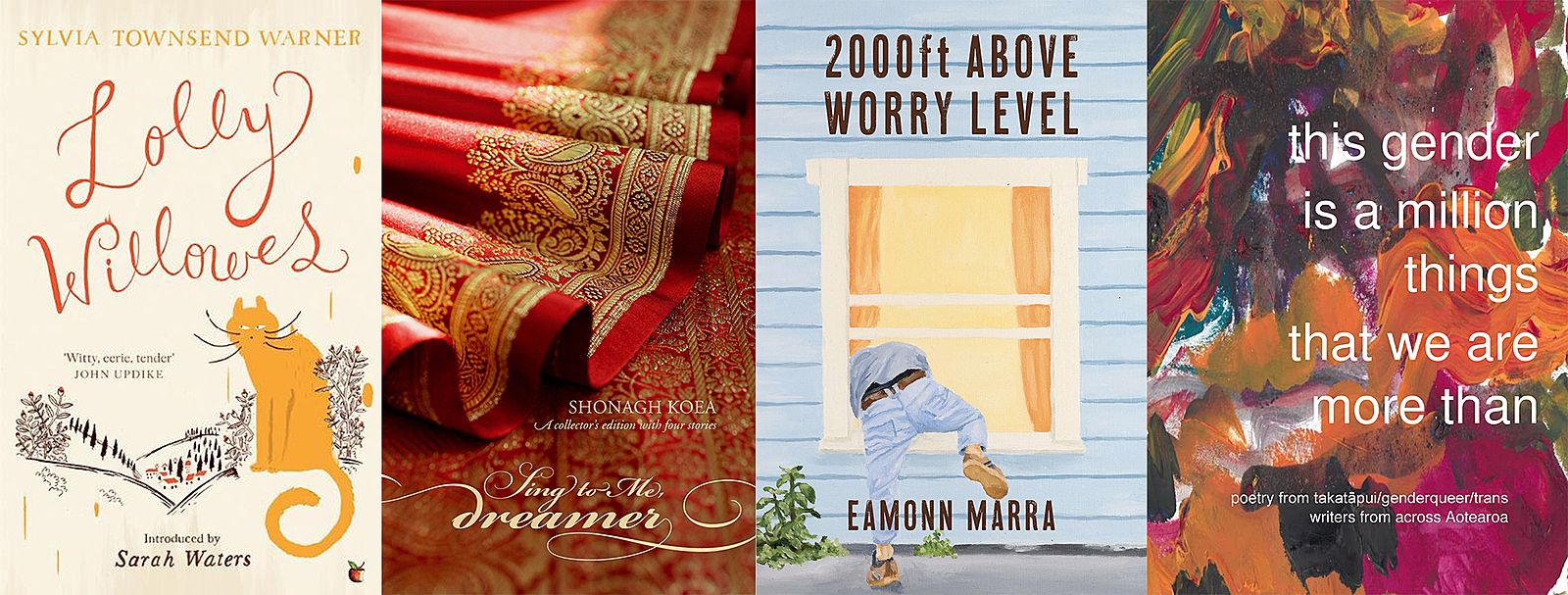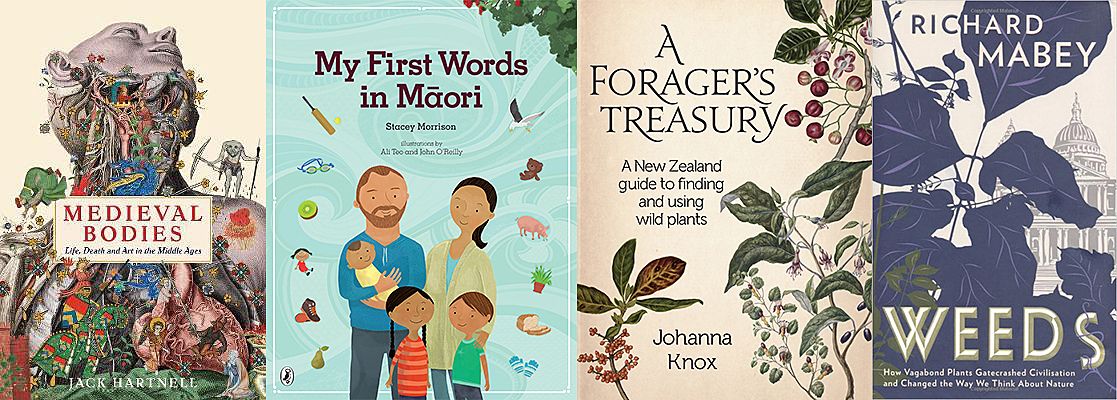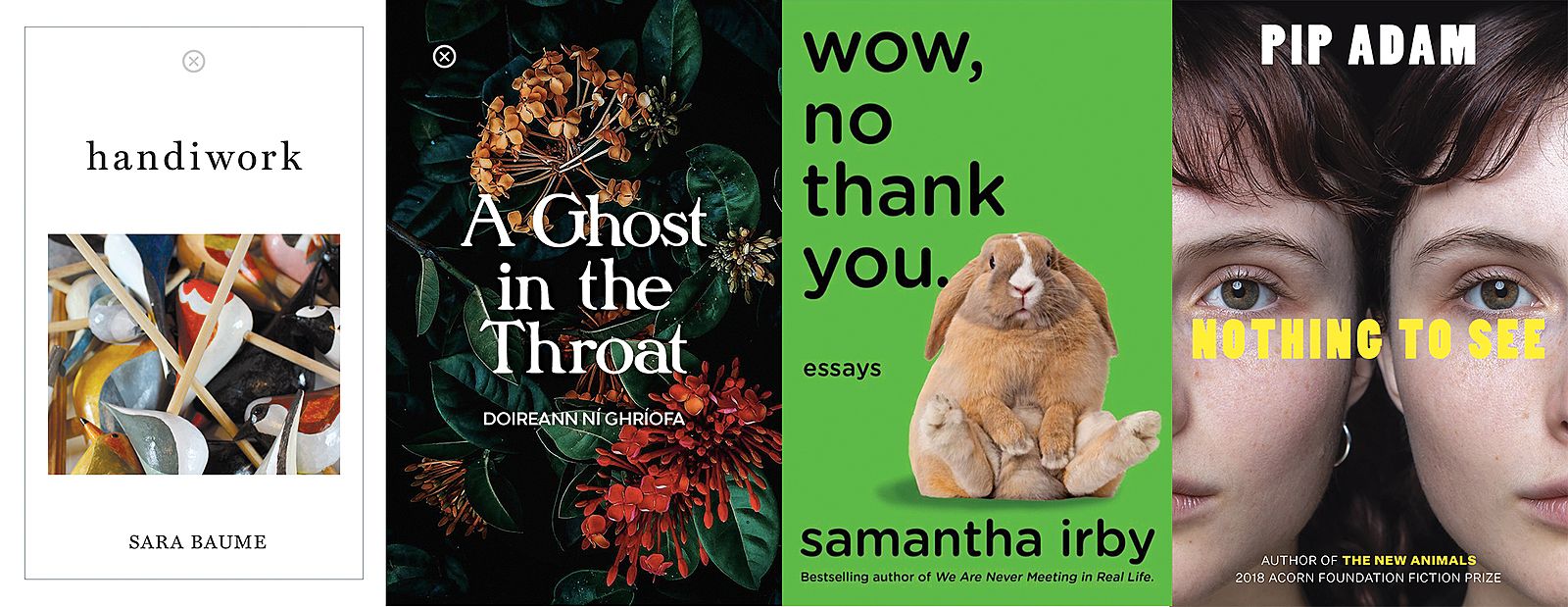Claire Mabey’s Lockdown Booklist
Stay Home, Save Lives, Read Books.
Director of Verb Festival and literary programmer for the New Zealand Festival of the Arts Claire Mabey shares her reading recommendations for these strange times.
Present Claire is extremely thankful to past Claire’s book-hoarding habits. There are the groaning bookshelves, but also the piles on the floor, on top of the piano, by the bed, by the baby’s bed, in boxes and stacked in a chest. It’s like I’ve been preparing some kind of bunker, and here we are.
What’s happening around the world is mostly unfathomable to me. I was feeling unlucky for a while – as an independent arts producer, what a time to be alive and live alongside your career choices. But then Jacinda and her team made call after call to protect people and look after the vulnerable and I realised just how lucky I really am. I’m with my family and we have a house to live in. And it’s full of books.
I once saw a play about a PhD student who got dragged into hell and asked to catalogue the devil’s library, then she and the devil got it on and had a great time. Books make a heaven out of hell. Even while our world suddenly feels a lot smaller and more cramped there is so much space to explore through reading. I wish everyone had the access, means and capacity for this kind of comfort. It makes me sad that many don’t.
When we’re out of this, I’m looking forward to making spaces for bookish conversation again, with people all together listening and sharing in the rapture of an imagined world, a captivating thesis, a complex idea explained, the everyday universes in poetry readings. Here are some of the ways I’m furnishing my and my family’s bodies, minds and wairua with these favourite things while we ride out an unprecedented crisis.
But first, a quick note on e-books. Personally, I just cannot do the e-reader thing. I’ve tried. It’s like I can’t read the words if I’m not holding the actual book with real pages I can turn and rough paper and a cover I can hold in my brain and flick through after I’ve finished reading. I know… you can’t help me.
But these are exceptional times, and not everyone is as ardently analogue as me. With the country currently in lockdown and our favourite local bookshops like Unity Books and The Children’s Bookshop unable to fill new orders during Alert Level 4, purchasing e-books is a practical way to access new reads and support authors and publishers until we can get back into our local bookshops. So links to purchase e-book editions are included wherever possible.
Domestic magic: Books that draw attention to the small things that make life weird and interesting
Lolly Willowes by Sylvia Townsend Warner (Kobo)
I don’t often have the luxury of reading back-catalogues or writers who have passed away. So I’m taking the opportunity to indulge a fascination with Sylvia Townsend Warner. Her first novel, Lolly Willowes, was published in 1923 and is one of the most exquisite, strange, and comforting books I’ve ever read. It’s essentially about deciding to be yourself and truly reach a state of freedom: a journey that can take a lifetime. Laura (Lolly) is a spinster (with fabulously sharp nose and strange manner) and follows her instinct to leave her well-meaning but stifling family to live in the village of Great Mop in the Chilterns. Sylvia Townsend Warner’s writing has a profoundly luminous quality. She focuses down into the detail of things and places and people in a way that makes their curious qualities and closeness startling. The story of Laura and the witch-filled village of Great Mop encapsulates the power that can be generated in the domestic sphere. You can cook up trouble and delight at home: you can smash the patriarchy and religious structures while still enjoying cosy cottages, hedgerows and Englishy-sounding dinners and mending sessions. I’ve now done a special order to get more of her novels, particularly The Corner That Held Them, about 14th-century nuns.
All the books ever by Shonagh Koea (e-books of most titles available via Penguin)
I think Shonagh Koea is one of the most under-appreciated and under-read Aotearoa novelists. Every single one of her brilliantly observed books is about a woman who is socially distant. Her work is darkly funny, melancholic and intelligent. Sing to me, Dreamer is probably her most famous novel and I love it (about a woman who comes back home to Wellington after years away in India where she was mistress to a Maharajah, and who takes in an elephant from the zoo to live in her back yard despite horrible, AMOG neighbour). But her other work is equally excellent, especially The Lonely Margins of the Sea, Yet Another Ghastly Christmas and The Grandiflora Tree. I’m re-reading Koea when I need to remember the fact that I actually like my own company and being at home.
2000ft Above Worry Level by Eamonn Marra (mebooks)
Once upon a time on RNZ we did a short-story club and one of my all-time favourites from that series was Eamonn’s, which was about two people trying to do cam sex. That story is the beginning of his novel, 2000ft Above Worry Level, a story made of the very pith of this earth right now. The best and the worst depths of living in this ludicrous mash of systems and digital communications and poverty, love, family and some kind of linear trajectory that we’re supposed to be looking for. Eamonn is one of those magnifying-glass-holding storytellers – you can see the world better through his work, you can laugh and cry with it more honestly.
All the poetry by all the poets
I’ve always thought of poetry as a furnishing. Somehow poems sit in my mind like objects alongside my life, in my home. Aotearoa is a global poetry hotspot. And so much is online: here are some of my favourites: Starling, Sweet Mammalian, Blackmail (incredible archives here), Ōrongohau | Best New Zealand Poems, this gender is a million things that we are more than (edited by essa may ranapiri), and have a look at London-based, Aotearoa poet Nina Powles’ Stay At Home Diary on her Bitter Melon Poetry website. I’m also a big fan of The Guardian’s Poem of the Week by Carol Rumens – her close readings help to expand out those concise lines into the huge ideas that they are.
Adventures and escape: Letting your imagination take you to another place, or another time, or make the world a better place
Pages & Co series by Anna James (Kobo)
Last year at a literary festival in the UK I met Anna James, author of the hugely successful Pages & Co series. Anna and I met in the writers’ tent at the festival after I had to go and introduce myself to her and blurt out something about how she looked like Anne of Green Gables. She really does. Thankfully, Anna is an extremely lovely and lively person and gets the Anne call all the time. Pages & Co is about Tilly, who lives in her grandparents’ bookshop and discovers the ability to wander in and out of books (AOGG features). I didn’t get around to buying the books while in the UK but a couple of weeks ago panicked that I didn’t have a new adventure series to start so ordered Pages & Co: Tilly and the Bookwanderers via The Children’s Bookshop and it’s now sitting safely on the bedside table, not a moment too soon.
Anne of Green Gables series by Lucy Maud Montgomery (Kobo)
Read it. Read all eight books in the series. Read them to your kids. I swear your quality of life will improve. Anne has been my great mate since I was eight and hated having red hair, too. Lucy Maud Montgomery created a person who could fire up the world with her mind. Despite horrors in her young, small life Anne allowed her spirit and imagination to polish up everything around her. She invented, she romanticised shamelessly and infectiously. Not many have read much of the series beyond Anne’s House of Dreams (in which she lives an isolated life as the local doctor’s wife and suffers terrible loss, but still exudes such generosity of spirit that she draws the few people around her into domestic safety). If you haven’t, I heartily recommend Anne of Ingleside, Rainbow Valley and Rilla of Ingleside. These final three books in the series depart a little from Anne and follow the lives of her children, all the way into World War I. I think everyone can learn a little from Lucy Maud and the life of her timeless character.
Bring up the Bodies and The Mirror and the Light by Hilary Mantel (Kobo)
Ah, my panic buy! On Tuesday I had a huge panic and felt I didn’t have enough reading material. This was truly ridiculous. However, I called a dear friend at Unity and explained my predicament, which was listened to and understood with consummate professionalism, and I now have Bring up the Bodies and The Mirror and the Light by Hilary Mantel. I read Wolf Hall years ago and loved it. I haven’t read the second book and look forward to some full-immersion time with this insanely talented writer and her Booker-hoovering Thomas Cromwell.
Hurricane Season by Fernanda Melchor (translated by Sophie Hughes) (Kobo)
Fitzcarraldo Editions publish gems: boundary-pushing, inventive fiction and essays from around the world. Fernanda Melchor’s Hurricane Season (translated by Sophie Hughes) is one of the most arresting novels I’ve read in a long time. Set in Mexico, the novel takes inspiration from real life to tell the story of a local witch-hunt. You will be swept along in a torrent and you will want to be saved, but you must keep reading. This author is hugely talented and this book is one of the most powerful I’ve read all year.
Learning at home: Books to marvel at and books to learn from
Medieval Bodies by Jack Hartnell (Kobo)
I picked this one up in Unity Books a couple of months ago because of the cover and also because I love medievalists. I follow a lot on Twitter and those old manuscripts are better than memes. This book is absolutely glittering with great writing and fascinating information. Jack Hartnell weaves together politics, art, music, medicine, religion, philosophy and history so entertainingly. The book is organised by body-part (Head, Skin, Stomach, Feet and so on) and draws you through the interconnected layers of medieval thinking: when the material, spiritual and physiological worlds were all there at once, messing with each other. The visual cultures that resulted are so astounding (there are lots of great colour pictures through the book) and are today a vivid hint at a whole other human world. Something that you might need while hunkering down in our current one.
My First Words in Māori by Stacey Morrison (Penguin, paperback only)
A hands up in the air for all the parents with toddlers at home this Covid-19 please. We are lucky to have a huge stack of kids’ books and lots of them are in te reo Māori. My First Words in Māori is a favourite because there is so much to look at, identify and learn together. The book is beautifully laid out and illustrated, and takes you from people and emotions, to the home, to the park, to the marae, to the beach, and names everything along the way. The book also comes with flashcards, which we’ve stuck up on our wall. Our toddler’s reo is coming along and I’m so grateful to the work that Stacey and Scotty Morrison are doing to make learning accessible in the home.
A Forager’s Treasury by Johanna Knox (Kobo)
Johanna Knox is a hugely knowledgeable forager and a lovely writer (The Fly Papers series, short stories for adults and children, and much else). I’ve owned this book for a few years now and have consulted it often but I’ve never used it on an actual foraging mission. It’s a compendium of plants and their uses, and how to identify them (with illustrations). It’s a treasure map of practical things and possible adventures. We’re lucky to live near bush tracks and I’ll be taking my toddler on foraging walks with A Forager’s Treasury in hand and staving off cabin fever in mind.
Weeds by Richard Mabey (Kobo)
This is another book I’ve had on my shelf for a while and one I’m reaching for again recently. It’s a cultural history of weeds by a celebrated nature writer. Richard explores why some plants are weeds and how they came to be classified as such. Why are some plants just survivors despite our best efforts? Richard Mabey manages to trace the whole history of an idea and make it easy for us to absorb. I’ve often thought about this book when something is overlooked that shouldn’t be: so often we’re taught to value certain things and ignore (or actively squash) others, when the opposite could be true. This book makes you consider what we ignore that might in fact deserve our full attention and empathy.
Up your pre-ordering game! Exciting books on the horizon
Lockdown is an excellent opportunity to practice the ‘But I really need this for later’ Pre-Order Strategy. Pre-ordering books is a way of giving future you a treat. You can’t achieve a house full of books without adding to your to-be-read piles. Also, bonus joy in knowing that you’ve probably helped an author and publisher see demand for their work. I’ve recently pre-ordered two books from Tramp Press, a small publisher in Ireland who are consistently putting out some of the best work from Irish writers.
handiwork by Sara Baume (Tramp Press)
handiwork is the first book of non-fiction from acclaimed novelist Sara Baume. About her book, Baum says:
This little book is a love-child of my art and writing practices, or a by-product of novels past and coming. It’s about the connection between handicraft and bird migration, as well as simply the account of a year spent making hundreds of small, painted objects in an isolated house.
A Ghost in the Throat by Doireann Ní Ghríofa (Tramp Press)
Doireann Ní Ghríofa’s A Ghost in the Throat is coming in August so I hope this amazing writer gets to celebrate it with a proper good party. Doireann travelled to Aotearoa two years ago for Verb Festival and LitCrawl. She is a phenomenal poet who writes in both Irish and English. She’s a feminist and a mother to four children, and an enormously dedicated writer who gets most of her work done in her car, parked on a rooftop carpark in Cork, where she lives. I’ve been looking forward to A Ghost in the Throat for so long, because listen to this:
A true original, this stunning prose debut by Doireann Ní Ghríofa weaves two stories together. In the 1700s, an Irish noblewoman, on discovering her husband has been murdered, drinks handfuls of his blood and composes an extraordinary poem that reaches across the centuries to another poet. In the present day, a young mother narrowly avoids tragedy in her own life. On encountering the poem, she becomes obsessed with finding out the rest of the story.
Wow, No Thank You by Samantha Irby (Faber & Faber)
I’m also pre-ordering Samantha Irby’s forthcoming essay collection, Wow, No Thank You. Samantha Irby is hilarious and clever. You can read her blog Bitches Gotta Eat and then get yourself her books. We all need Samantha Irby in our lives.
Nothing To See by Pip Adam (Victoria University Press)
Locally, I’m also pre-ordering Pip Adam’s forthcoming novel, Nothing To See. Pip is one of Aoteroa’s most inventive and startling novelists. I can’t wait for Nothing To See and know it will feed my hunger for fucking brilliant writing.
For more recommendations to pass the time during isolation don’t miss Online Free Festival: The Definitive Pantograph Punch Lockdown List and our Lockdown Film Festival.
Feature image: Claire Mabey





